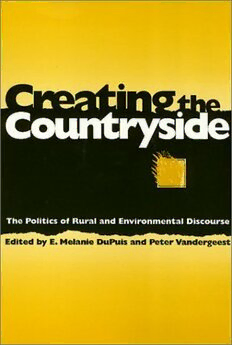
Creating The Countryside: The Politics of Rural and Environmental Discourse (Conflicts Urban & Regional) PDF
360 Pages·1996·13.143 MB·English
Most books are stored in the elastic cloud where traffic is expensive. For this reason, we have a limit on daily download.
Preview Creating The Countryside: The Politics of Rural and Environmental Discourse (Conflicts Urban & Regional)
Description:
What does it mean to save nature and rural life? Do people know what they are trying to save and what they mean by "save"? As the answers to these questions become more and more unclear, so, too do the concepts of "environment," "wilderness," and "country." From the abuse of the Amazon rain forest to how Vermont has been marketed as the ideal rural place, this collection looks at what the countryside is, should be, or can be from the perspective of people who are actively involved in such debates. Each contributor examines the underlying tendencies and subsequent policies that separate country from city, developed land from wilderness, and human activity from natural processes. The editors argue in their introduction that these dualistic categories limit our ability to think about environmental and rural problems and hamper our ability to formulate practical, realistic, and just solutions.This book's interpretive approach to the natural world explores why people make artificial distinctions between nature and culture, and how people can create new forms of sustainable development in terms of real problems and real places. E.Melanie DuPuis is Economic Development Policy Analyst covering environmental policy at the New York State Department of Economic Development. Peter Vandergeest is Senior Fellow on the Faculty of Environmental Studies at York University, and Assistant Professor of Pacific and Asian Studies at the University of Victoria.
See more
The list of books you might like
Most books are stored in the elastic cloud where traffic is expensive. For this reason, we have a limit on daily download.
